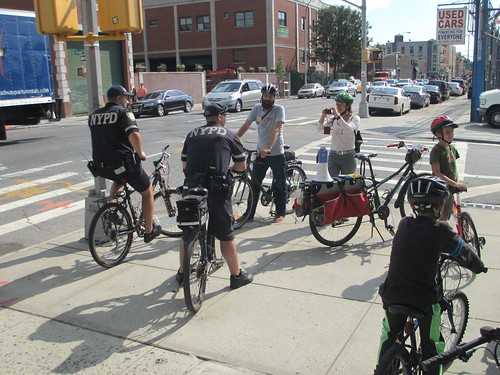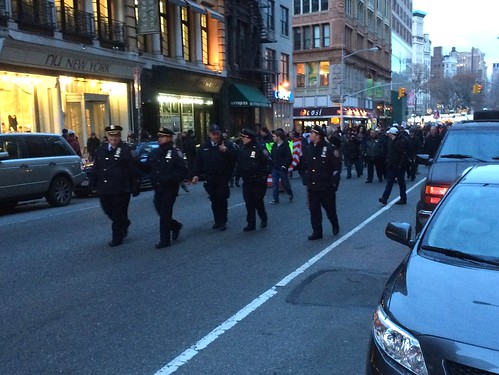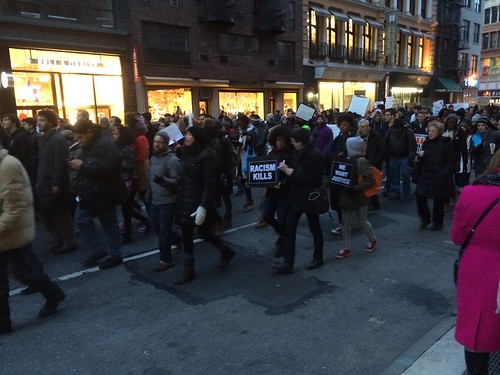It was one Saturday back in
September that I had much my most positive experience with officers of the New
York Police Department. My family and I were taking part in a Kidical Mass ride
for families from a park in Gowanus, near our home, to the Brooklyn
waterfront. Two bike patrol officers from the NYPD’s 78th precinct joined us,
as did a community relations officer and Frank DiGiacomo, the
precinct commander. The officers stopped traffic to allow our families to ride
through difficult intersections and chatted to us as we rode along.
 |
| A positive cyclist-police interaction: Hilda Cohen, ride organiser, photographs two members of the 78th Precinct's bike patrol. |
By the time we reached Pier Six
looking across to Manhattan ,
I was feeling warm enough towards them to try a gentle joke.
“I suppose I don’t really need to
ask a police officer whether he’d like a doughnut,” I said to one of them, as I
proferred him a bag of police officers’ favourite treat.
He felt sufficiently friendly in
the other direction that he replied with a friendly punch to my shoulder.
I’ve been thinking about that
incident in the last few days because of an appalling act of brutality against
two NYPD officers just a few miles from where I gave the bike patrol officers
their doughnuts. On December 20, as my family and I were packing for our
Christmas break in the United Kingdom, Ismaaiyl
Brinsley, a 28-year-old black man, walked up to a police patrol car and shot the two police officers inside - Wenjian Liu and Rafael Ramos – in the head,
killing both. Brinsley, who had posted anti-police messages on Instagram, then
ran into the Willoughby Avenue
Given that Brinsley’s aim appears
to have been to kill New York
police officers no matter who they were, he could just have easily targetted
any of the four who accompanied us.
The incident has challenged me to
consider whether I, as someone who’s regularly complained about the attitudes
of the NYPD both over traffic policing and race relations, helped to create the
atmosphere that led to Saturday’s horrendous deaths. Pat Lynch, president of the
Patrolmen’s Benevolent Association, the New
York police union, expressed fury in the wake of the
crime over the criticism his members have faced in recent weeks.
"There's blood on many hands tonight - those that
incited violence on the street under the guise of protest, that tried to tear
down what New York City
police officers did every day," Lynch said outside the hospital where the
officers were taken. "We tried to warn - 'it must not go on, it cannot be
tolerated’. That blood on the hands starts on the steps of City Hall, in the
office of the mayor."
 |
| The Invisible Visible Man and Bill de Blasio, while the now- mayor was campaigning. Both of us, I'm sure, have had reason these past few days to reflect on Pat Lynch's criticisms. |
Lynch’s comments, although intemperate, have made me look back on
that September bike ride and wonder if those cycling officers perhaps
represented a truer face of the NYPD than I’ve previously recognised. I’ve consistently focused on the negatives about the
force. As a well-off white person, after all, I don’t rely as heavily on the
police’s protection from crime as residents of the Tompkins Houses public
housing, outside which Liu and Ramos were sitting. I encounter officers mainly
when they’re in my way – for example, when they’re blocking bike lanes.
Since the police department’s handling
of the issue that most acutely concerns me – road safety – is grossly
inadequate, I’ve tended to feel resentful when I’ve encountered individual
police officers, especially when they’re engaged in some pointless traffic
policing. Because statistics show that there are disproportionately high
numbers of brutality claims from blacks and Latinos, I’ve sometimes assumed
that pretty much any police officer I encounter is likely to be racist.
It’s easy for someone such as me to
ignore the effects of, say, last year’s sharp drop in New York City
 |
| Families part-way through September's Kidical Mass ride: a scene I should recall when I wonder what the NYPD has done for me |
I’ve sometimes, I suspect, drifted
close to the same thinking error as Ismaaiyl Brinsley,
by viewing individual members of the NYPD as if they were responsible for the
collective failures of the group or its culture. Liu and Ramos, as far as I
know, were no more responsible for the wider failings of their department than
I am responsible, say, for the conduct of cyclists who misbehave on the roads,
or for the shortcomings of other British journalists.
Yet it remains fatuous to
pretend that Brinsley decided to act as he did other than of his own free will.
Even if the protesters’ rhetoric had not been mostly admirably temperate, only
Brinsley himself decided to pervert the understandable, justifiable anger over
the police’s killing of Eric Garner in Staten Island and Mike Brown in
Ferguson, Missouri, into murderous rage against individual officers. The story
is at least complicated by Brinsley’s having shot in Baltimore ,
before he headed to Brooklyn , Shaneka
Thompson, his girlfriend, who is not a police officer. She remains in hospital.
It makes no more sense to
claim protesters somehow prompted Brinsley’s misdeeds than to claim that the
NYPD somehow deserved them.
Instead, Brinsley was
acting like the worst of the police officers he so hated. He showed the
nihilistic lack of self-control that is a hallmark of many police brutality
cases. Like the worst police officers, he used unjustified violence in such a
way that the victims would have no reasonable chance to respond. He seems to
have shared with violent cops a determination to impose his will on others no
matter the havoc he risked unleashing.
It is certainly an
important distinction that police officers are sometimes entirely justified in
using violence, in a way that ordinary citizens seldom are. It’s also critical,
however, that police officers are expected to act with discipline and self-restraint
in a way that no-one expects a common criminal to do.
It’s vital to point out
the balance of risks. New York
US Society, however,
shouldn’t be tolerating even that limited amount of violence against police
officers – just as it most assuredly should not tolerate the casual tossing
aside of black people’s lives. While Ismaaiyl Brinsley had no justification for
his brutal killing, there was also no justification for the actions of
“pro-police” demonstrators who on Friday evening, the night before Brinsley’s
attack, paraded outside New York Staten Island sidewalk.
It’s critical if this rift
is to be healed to get away from the divisive rhetoric that currently
disfigures nearly every debate in US
I would normally offer
policy prescriptions for how I think that can be achieved. But, after a year of
chronicling dispiriting car crashes and a miserable deterioration in the US New York
Given the time of year,
I’ve been prompted regularly in recent weeks to advocate that somehow the wider
city could be more like the Episcopal Church I attend every Sunday in Park
Slope. The congregation is made up of a vast range of people – around half of
them black – of many different ages, backgrounds and sexual orientations. There
is what feels to me, as a relative newcomer, a remarkable sense of unanimity
for such a diverse group.
 |
| Note to self: next time you see a line of cars like this, remember there are people inside |
I attend the church partly
because its clergy have been so quick to recognise the spiritual importance of
contemporary events in the US
While I know that few if
any of my readers will share my specifically Christian experience of the last
few months’ events, I imagine I can’t be the only one who’s had a sense of
something truly momentous happening. The questions feel bigger than individual
human beings.
I found myself describing to my wife recently the powerful sense I’ve
experienced at points in recent weeks of how my faith relates to my feelings
over the injustices I’ve seen being perpetrated.
“I keep thinking that
somehow Jesus is there,” I told her, of Eric Garner’s death. “He’s lying
facedown in front of a row of tacky shops in Staten Island .”
I have a similar sense
about Michael Brown’s death in Ferguson ,
Missouri
They’re thoughts that will,
I’m sure, seem to many like the kind of foolish sentimentality against which I
normally rail. To atheists, they will seem like the kind of deliberate
missing-of-the-point of which they accuse all religious people.
Perhaps they are right.
But, for the moment, I
also can’t help feeling that the central figure of my faith in some sense also
sides with officers Liu and Ramos. Five days before Christmas,
Jesus lay on the sidewalk beside them as paramedics worked in vain to undo yet
another senseless injustice.


I am certain (and in agreement with you) that we will have to turn away from violence driven by rage, and toward compassion, understanding, forgiveness, and justice if we are to make it through this. When people accuse me of missing the point, I ask them what specific, actionable suggestions they have to improve the situation. So far, that question has been met with more rage only, so it may be too early to ask. If / when people come to their senses, perhaps some deep wisdom based on love and hope rather than rage and resentment will take hold. Perhaps.
ReplyDeleteJRA,
DeleteThank you as ever for your wise comments.
There are, I suppose, practical things one can do to improve things. Better regulation of guns springs to mind.
But ultimately the angry rhetoric isn't getting anyone anywhere. Pat Lynch's rhetoric is gradually growing angrier. He's talking about the city's being full of "friends" and "enemies" of the police. It can only be a disaster to continue down this path of division.
All the best,
Invisible.
This Christmas, let's ALL reflect on what we can do to make next year better. Thanks for your thoughts on many topics this year...
ReplyDeleteSteve A,
DeleteAnd thank you for your wise, supportive comments throughout the year. I hope that 2015 brings you continued good fortune over there in the Pacific North West.
All the best,
Invisible.